Interview - Miss Peregrine's Home For Peculiar Children: Let's talk with Matthew Margeson and Michael Higham
By Mulder, Los Angeles, 06 october 2016
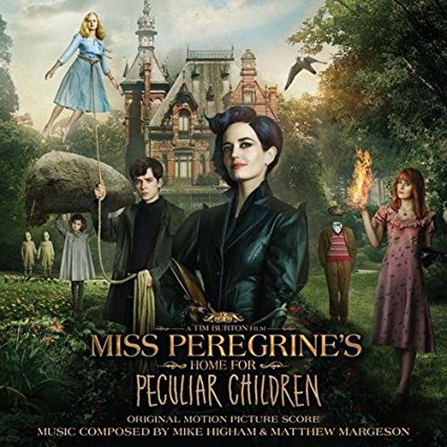
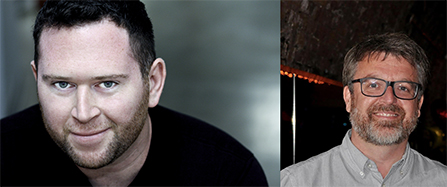
Q : On the 19th september, we discovered Miss Peregrine's Home For Peculiar Children, the new Tim Burton’s fim . We enjoyed the score of this film and the mix of orchestral and synthetic elements. How did you work on this film with Tim Burton ?
Matthew Margeson : Michael Higham has worked with Tim on quite a few films & I had worked with Michael on two other films prior to Miss Peregrine. When Tim started thinking about music for Miss P, Michael brought me in to meet Tim as he thought I’d bee a good fit for the project. We ultimately decided to collaborate on the music for the film.
Michael Higham : I have worked with Tim on many of his films in various roles and therefore had a relationship with him. I love collaborating on projects and Matt and I have worked together in the past and it seems a very logical progression.
Q: We have nearly seen all the films you worked on as Eddie The Eagle (2015) and with Henry Jackman (Kiss ass 2 (2013), Kingsman: The Secret Service (2015). Can you tell us a little about your musical background? Can you also talk about your collaboration with the composer ?
Matthew Margeson : I started meddling around on an old organ that was in my grandparents house when I was around 5 years old. When my parents noticed that I was actually playing tunes that I knew, nursery rhymes, etc., they decided to start me on piano lessons. I saw my first broadway musical when I was about 12, which was a game changer for me. I studied at Film Scoring & Composition at Berklee College of Music, Boston and drove out to Los Angeles quickly afterwards. After a few months of looking for a way into the film music industry, I landed an apprenticeship at Hans Zimmer’s studio, Remote Control Productions. A few years later I met Henry Jackman, who also had residency at “Remote.” I started doing ‘middle of the night’ arrangements on some of Jackman’s films and the rest is history… We work very well together and have a great respect for each other both as people and as artists.
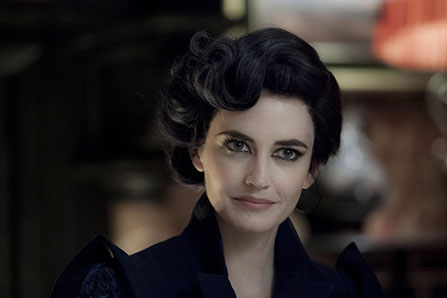
Q: What is your best memory working with a director on a movie ?
Michael Higham : The best memory is when you watch a film progress through the film making progress and understand new things about the Director and learn from him or her.
Matthew Margeson : Each film is different and has it’s own very special experiences. Musically, I’d say Eddie the Eagle is one that will always stick with me. I was able to commit to write a genre 80’s score that really commits to that specific sound. I doubt I’ll ever get the chance to do something that lends itself to that genre again…. but who knows ;-)
Q: How have you divide the score up on this new Tim Burton’s film ?
Michael Higham’ : Matt is always a great collaborator and dividing the score up was just an instinctive process. We would both work on ideas and get together frequently (we only worked 10 minutes away from each other) to share them. The process grew from listening to each others ideas.
Matthew Margeson : Working alongside Michael was such a great experience. Our studios were set up about a 5-7 minute walk from each other, so we were able to visit each other a few times a day and see what the other was up to. We worked linearly, meaning we started at the beginning of the film and didn’t jump around that much. The best thing about Michael and my relationship is that we drop our egos at the door. We were each open to suggestions by the other person; it ultimately enhanced the score and the film.

Q: What was the main difficulties you encountered during the creation of this score ?
Michael Higham’s : The film is really centered around Jake’s journey. It was very important to follow that thread and not get ahead of the journey. The film is one long build and it was important that we reinforced that.
Matthew Margeson : At the beginning of the process, we struggled for a bit on what to do, musically, for the Hollows and the Barron. We tried out a bunch of ideas that weren’t quite sticking. Then after much trial & error, put our heads together and wrote a simple motif that really pinned you to the character. Tim heard our new idea and loved it.
Q: What is to you the best scene in this film and how did you process to create its score ?
Michael Higham’s : There are many great set pieces, a lot of them are my favourite!
Matthew Margeson : I really love the set-piece in the film when Emma brings Jake underwater to see her hideaway place, an old sunken boat called The Augusta. I think going into that scene, we knew we wanted the music to be somewhat fluid, active, and liquid to represent the majesty of both the boat, and the environment of being underwater. The amazing visuals that Tim provided for the scene made it a pleasure to write.
Q: How have you chosen the instruments to use for this film ?
Michael Higham : It was an organic process for sure. We used real voices and instruments and manipulated then to try and create unique sounds. There is a fairly eclectic pallets including Wurlitzer and Vibraphone whose sound really seem to glue to the picture
Matthew Margeson : The score for the film is primarily orchestra. There are a bunch of subtle synths that are also in the score in our efforts to make is sound somewhat odd, to represent the children, who themselves, are a bit odd. Many of the non-organic, synthetic sounds you hear are actually based on organic source material, ie. guitars, solo male voices, etc.
Q: To you, how this score refleats the mood of the main characters ?
Michael Higham : Certainly in the case of Jake, we tried to create a feeling of a journey which was based around a cycle of 4 chords. Hopefully this becomes familiar throughout the film without being to obvious. By using that harmonic progression in the more Teenager Angst scenes it hopefully help to solidify the emotions.
Matthew Margeson : I think the sonic pallets of the score represents the characters quite well. For the peculiars, as mentioned above, are represented by some sounds you haven’t heard before, some synthetic timbres that are just a bit off, in some places. The music for the Barron and his baddies, is slow movie, slowly growing motif. The Barron is like this evil force that just keeps getting bigger and bigger, closer and closer.
Q: How did you create the main theme of this film ?
Michael Higham : Tim wanted a poetic feel with a sense of haunting. Having the main theme feel a little “off” seemed to feel right and Tim responded to that.
Matthew Margeson : The main theme for Miss P is like a haunted lullaby. We discussed with Tim the mood of the score, and the main theme quite a bit before we started. He was clear that he wanted a simple score… something that wasn’t too active, but should definitely be reminiscent of a bedtime lullaby. He always encouraged us to subtly be a bit ‘off’ with each scene.
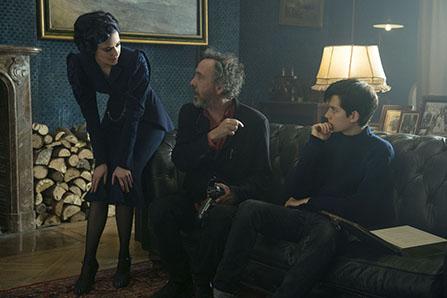
Q: Did you know Michael Higham before this collaboration on this score ?
Matthew Margeson : Yes, we’ve worked together on 2 films prior to this.
Q: what do you like about the process of film scoring?
Michael Higham : Helping the audience to feel (hopefully!) the right emotion when watching a scene is always rewarding.
Matthew Margeson : The best part of the scoring process for me, is the scoring sessions themselves. You end up writing for weeks, sometimes months and put a lot of hard work and LOTS of hours into each scene. At the end of the process, when you end up in a room with 80 musicians all playing the music you’ve written… the sleepless nights and deadline anxiety all goes away. It really is the best process of making a film.
Q: Which composers are for you a source of inspiration ?
Matthew Margeson : Some of my favorites are Clint Mansell, John Powell, Hans Zimmer, John Williams, Barry, Goldsmith, Morricone…. the list goes on and on!
Q: Which American directors would you like to work with and why?
Michael Higham : Clint Eastwood. I understand that he likes to work quickly and has a very clear vision, that is always appealing.
Q: To you, why music is so important in a film?
Michael Higham : It brings another dimension to the entire experience.
Matthew Margeson : Music is the heartbeat. Lack of music can be the heartbeat. The wrong music could lead to a heart attack.
Q: What are your current project (s) ?what can you say about Rings (2016) and about your new collaboration with Henry Jackman on Kingsman: The Golden Circle ?
Michael Higham : Mary Poppins Returns for Disney.
Matthew Margeson : Rings is nearly wrapped…. because of some scheduling conflicts, I only had about three and a half week to write that score, so it was quite a lot of music to be composed in a little time. I love doing that (only every once in a while). It causes you to immediately go into hyper drive for a few weeks. Months after your finished, you look back and ask yourself how you ever made it to the finish line. As for Kingsman — not much to say at this point… we’re starting to have some discussions on the direction of the film, tone, pace etc.; very early stages ;-)
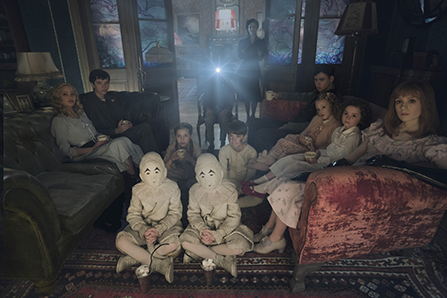
Q: What kind of advice could you give to someone who would like to work as a musical composer?
Michael Higham : Just write music everyday and it doesn't matter if it is not to a visual. Just write!
Matthew Margeson : earn to live and function on very little sleep. Always trust yourself and your director. Leave your ego at home & never get too attached to your music…. a lot of it ends up on the floor ;-)
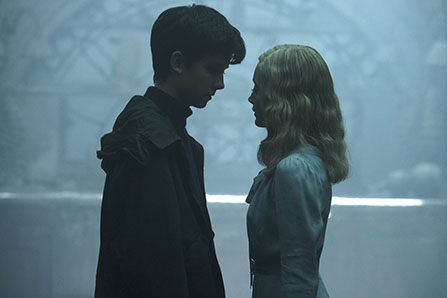
We sincerely thank Matthew Margeson and Michael Higham for answering our questions
A special thanks to Andrew P. Alderete

